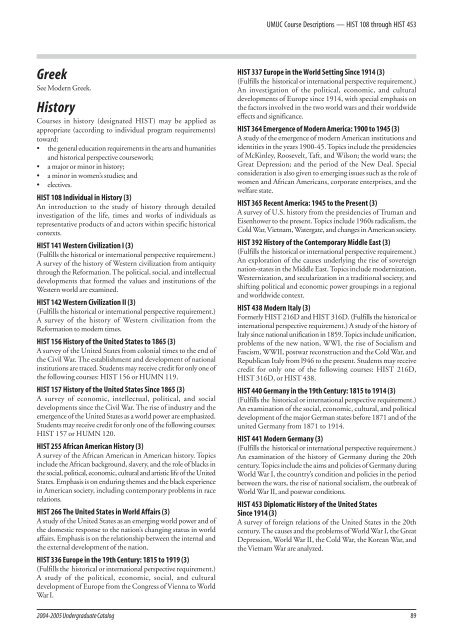Statements of Policy - UMUC Europe
Statements of Policy - UMUC Europe
Statements of Policy - UMUC Europe
Create successful ePaper yourself
Turn your PDF publications into a flip-book with our unique Google optimized e-Paper software.
Greek<br />
See Modern Greek.<br />
History<br />
Courses in history (designated HIST) may be applied as<br />
appropriate (according to individual program requirements)<br />
toward:<br />
• the general education requirements in the arts and humanities<br />
and historical perspective coursework;<br />
• a major or minor in history;<br />
• a minor in women’s studies; and<br />
• electives.<br />
HIST 108 Individual in History (3)<br />
An introduction to the study <strong>of</strong> history through detailed<br />
investigation <strong>of</strong> the life, times and works <strong>of</strong> individuals as<br />
representative products <strong>of</strong> and actors within specific historical<br />
contexts.<br />
HIST 141 Western Civilization I (3)<br />
(Fulfills the historical or international perspective requirement.)<br />
A survey <strong>of</strong> the history <strong>of</strong> Western civilization from antiquity<br />
through the Reformation. The political, social, and intellectual<br />
developments that formed the values and institutions <strong>of</strong> the<br />
Western world are examined.<br />
HIST 142 Western Civilization II (3)<br />
(Fulfills the historical or international perspective requirement.)<br />
A survey <strong>of</strong> the history <strong>of</strong> Western civilization from the<br />
Reformation to modern times.<br />
HIST 156 History <strong>of</strong> the United States to 1865 (3)<br />
A survey <strong>of</strong> the United States from colonial times to the end <strong>of</strong><br />
the Civil War. The establishment and development <strong>of</strong> national<br />
institutions are traced. Students may receive credit for only one <strong>of</strong><br />
the following courses: HIST 156 or HUMN 119.<br />
HIST 157 History <strong>of</strong> the United States Since 1865 (3)<br />
A survey <strong>of</strong> economic, intellectual, political, and social<br />
developments since the Civil War. The rise <strong>of</strong> industry and the<br />
emergence <strong>of</strong> the United States as a world power are emphasized.<br />
Students may receive credit for only one <strong>of</strong> the following courses:<br />
HIST 157 or HUMN 120.<br />
HIST 255 African American History (3)<br />
A survey <strong>of</strong> the African American in American history. Topics<br />
include the African background, slavery, and the role <strong>of</strong> blacks in<br />
the social, political, economic, cultural and artistic life <strong>of</strong> the United<br />
States. Emphasis is on enduring themes and the black experience<br />
in American society, including contemporary problems in race<br />
relations.<br />
HIST 266 The United States in World Affairs (3)<br />
A study <strong>of</strong> the United States as an emerging world power and <strong>of</strong><br />
the domestic response to the nation’s changing status in world<br />
affairs. Emphasis is on the relationship between the internal and<br />
the external development <strong>of</strong> the nation.<br />
HIST 336 <strong>Europe</strong> in the 19th Century: 1815 to 1919 (3)<br />
(Fulfills the historical or international perspective requirement.)<br />
A study <strong>of</strong> the political, economic, social, and cultural<br />
development <strong>of</strong> <strong>Europe</strong> from the Congress <strong>of</strong> Vienna to World<br />
War I.<br />
<strong>UMUC</strong> Course Descriptions — HIST 108 through HIST 453<br />
HIST 337 <strong>Europe</strong> in the World Setting Since 1914 (3)<br />
(Fulfills the historical or international perspective requirement.)<br />
An investigation <strong>of</strong> the political, economic, and cultural<br />
developments <strong>of</strong> <strong>Europe</strong> since 1914, with special emphasis on<br />
the factors involved in the two world wars and their worldwide<br />
effects and significance.<br />
HIST 364 Emergence <strong>of</strong> Modern America: 1900 to 1945 (3)<br />
A study <strong>of</strong> the emergence <strong>of</strong> modern American institutions and<br />
identities in the years 1900-45. Topics include the presidencies<br />
<strong>of</strong> McKinley, Roosevelt, Taft, and Wilson; the world wars; the<br />
Great Depression; and the period <strong>of</strong> the New Deal. Special<br />
consideration is also given to emerging issues such as the role <strong>of</strong><br />
women and African Americans, corporate enterprises, and the<br />
welfare state.<br />
HIST 365 Recent America: 1945 to the Present (3)<br />
A survey <strong>of</strong> U.S. history from the presidencies <strong>of</strong> Truman and<br />
Eisenhower to the present. Topics include 1960s radicalism, the<br />
Cold War, Vietnam, Watergate, and changes in American society.<br />
HIST 392 History <strong>of</strong> the Contemporary Middle East (3)<br />
(Fulfills the historical or international perspective requirement.)<br />
An exploration <strong>of</strong> the causes underlying the rise <strong>of</strong> sovereign<br />
nation-states in the Middle East. Topics include modernization,<br />
Westernization, and secularization in a traditional society, and<br />
shifting political and economic power groupings in a regional<br />
and worldwide context.<br />
HIST 438 Modern Italy (3)<br />
Formerly HIST 216D and HIST 316D. (Fulfills the historical or<br />
international perspective requirement.) A study <strong>of</strong> the history <strong>of</strong><br />
Italy since national unification in 1859. Topics include unification,<br />
problems <strong>of</strong> the new nation, WWI, the rise <strong>of</strong> Socialism and<br />
Fascism, WWII, postwar reconstruction and the Cold War, and<br />
Republican Italy from l946 to the present. Students may receive<br />
credit for only one <strong>of</strong> the following courses: HIST 216D,<br />
HIST 316D, or HIST 438.<br />
HIST 440 Germany in the 19th Century: 1815 to 1914 (3)<br />
(Fulfills the historical or international perspective requirement.)<br />
An examination <strong>of</strong> the social, economic, cultural, and political<br />
development <strong>of</strong> the major German states before 1871 and <strong>of</strong> the<br />
united Germany from 1871 to 1914.<br />
HIST 441 Modern Germany (3)<br />
(Fulfills the historical or international perspective requirement.)<br />
An examination <strong>of</strong> the history <strong>of</strong> Germany during the 20th<br />
century. Topics include the aims and policies <strong>of</strong> Germany during<br />
World War I, the country’s condition and policies in the period<br />
between the wars, the rise <strong>of</strong> national socialism, the outbreak <strong>of</strong><br />
World War II, and postwar conditions.<br />
HIST 453 Diplomatic History <strong>of</strong> the United States<br />
Since 1914 (3)<br />
A survey <strong>of</strong> foreign relations <strong>of</strong> the United States in the 20th<br />
century. The causes and the problems <strong>of</strong> World War I, the Great<br />
Depression, World War II, the Cold War, the Korean War, and<br />
the Vietnam War are analyzed.<br />
2004-2005 Undergraduate Catalog 89






